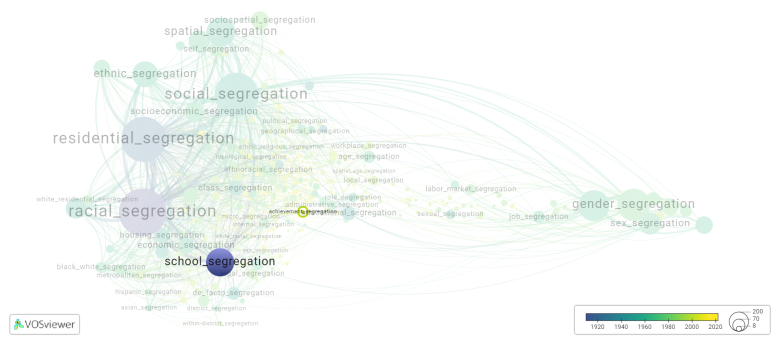Achievement segregation
Date and country of first publication[1]
2010
Australia
Definition
Achievement segregation refers to the unequal distribution of resources, opportunities, and recognition based on factors such as race, gender, socioeconomic status, or other forms of discrimination. This can result in certain individuals or groups being systematically disadvantaged and prevented from achieving their full potential. It is important to address achievement segregation in order to promote fairness, equality, and diversity in various aspects of society.
See also
Related segregation forms
Achievement segregation is frequently discussed in the literature with the following segregation forms:
Visualization based on the research
For the complete network of associated segregation forms, see:
- First year of publication https://tinyurl.com/2235lkhw
- Louvain clusters https://tinyurl.com/2d8wg5n3
- Betweenness centrality https://tinyurl.com/223udk5r
- Disciplines where segregation forms first appeared https://tinyurl.com/244d8unz
References
Notes
- ↑ Date and country of first publication as informed by the Scopus database (December 2023).
At its current state, this definition has been generated by a Large Language Model (LLM) so far without review by an independent researcher or a member of the curating team of segregation experts that keep the Segregation Wiki online. While we strive for accuracy, we cannot guarantee its reliability, completeness and timeliness. Please use this content with caution and verify information as needed. Also, feel free to improve on the definition as you see fit, including the use of references and other informational resources. We value your input in enhancing the quality and accuracy of the definitions of segregation forms collectively offered in the Segregation Wiki ©.
Achievement segregation appears in the following literature
Kelly S. (201). A crisis of authority in predominantly black schools?. Teachers College Record, 112(5), 1247-1274. Teachers College, Columbia University.https://doi.org/
Brouwer J., Flache A., Jansen E., Hofman A., Steglich C. (2018). Emergent achievement segregation in freshmen learning community networks. Higher Education, 76(3), 483-500. Springer Netherlands.https://doi.org/10.1007/s10734-017-0221-2
Welsh R.O. (2018). Student Mobility, Segregation, and Achievement Gaps: Evidence From Clark County, Nevada. Urban Education, 53(1), 55-85. SAGE Publications Inc..https://doi.org/10.1177/0042085916660349

